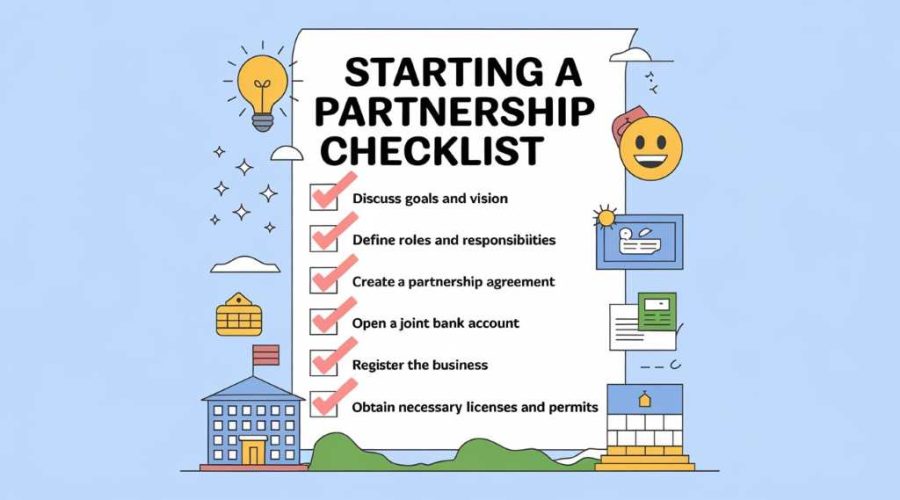Entering into a business partnership is pleasing, ambitious, and calls for adequate preparations especially since becoming partners is kind of similar to entering an escapade with a few important people. Here is an exhaustive business partnership checklist to help you start a business partnership from the initial stage to the completion of forming the partnership.
Choose the Right Partner
Why it Matters
It is important to select a partner who will fit in. Consider it as choosing someone to act as your co-pilot through a long journey. You would want them to be dependable and honest and most of all be of different yet useful competencies.

How to Choose
Shared Goals: Ensure you both have the same goals and vision for the business.
Skills Mix: Seek for a person who has skills you don’t have, such as finding an operational person if one is good at selling.
Communicate and Trust: Trust is very important in any partnership, therefore, mutual trust must exist. Communicate with each other and be open.
Define the Partnership
Types of Partnerships
A partnership may take different forms and each type has its own particular rules and liabilities.
General Partnership (GP): There is equal liability on both partners.
Limited Partnership (LP): There is one general partner who runs the business while the other(s) is usually inactive.
Limited Liability Partnership (LLP): All the partners have some level of protection so that none of them is liable for the other’s wrongdoing.
Register Your Business
Legal Requirements
This is the stage where you cannot skip if you wish to go legal with the undertaken activities. It legalizes your partnership and will help you to protect your business.
Business Name: Pick a name that embodies your brand but does not be so fast as to rush to register it before checking if anyone has already taken that name.
Register with the State: Complete the business registration process in your state.
Employer Identification Number (EIN): Generate an EIN from the IRS for tax identification.
Set Up Finances
Financial Planning
Proper financial planning is of great importance when instituting your partnership.
Bank Accounts: Separate personal expenses from those of the business by having a business operating account.
Accounting System: Track the income and expense movement by maintaining proper books of accounts.
Funding: In what ways would you raise the required finances for the business? Will it include personal finances, loans or investors?
Assembling A Business Plan
Why You Need One
Such a document is a business establishment plan. It tells what business objectives you are setting and how you are going to achieve them.
Executive Summary: A short description of the business entity is provided.
Market analysis: Investigate your industry, the market, and rivals.
Marketing Strategy: Explain how you will get and keep customers.
Financial Projections: Present thе comprehensive details оf financial predictions.

Safeguard Your Company
Legal protections
It is very important for a business to protect itself against legal issues in the business environment.
Insurance: Obtain the appropriate forms of insurance coverage for your business.
Trademarks and Patent: Safeguard your innovations by acquiring legal monopolies over them.
Contracts: Put current and past arrangements with customers, vendors, and employees in writing.
Communication and collaboration
Maintaining the Partnership
When it comes to partnerships efficient communication and collaboration between the actors involved is a requisite for success.
Regular meetings: Schedule general discussions about the activities carried out and any problems that may need to be dealt with.
Clear communication: Communication is very important and as such, you should be honest in your communication.
Conflict resolution: Procedure or the strategy to resolve an argument overtime.
Growth plan
Making Your Business Expand
As the business expands, there will be the need to change the way of operating the business and grow it accordingly.
Hiring: Prepare for hiring new employees whenever it’s necessary.
Take Off: Think about growing what you sell or the service you offer.
Equipment: Increase the attainment of technology that can improve business performance.
Evaluate Results
Elaboration
Ongoing evaluation of business operation is necessary to provide assurance that set objectives are realizable.
Key Performance Indicators: Determine key performance indicators to monitor.
Financial Reports: Make sure that financial reports are prepared in appropriate intervals.
Customer Feedback: Collect and implement the customer’s response regarding your product/services.
Stay Compliant
Legal and Regulatory Compliance
Take care that your enterprise meets the requirements and resolutions for mother country governing the business.
Licenses and Permits: Apply for, acquire and renew the required licensing and permitting activities.
Tax Compliance: Comply with tax obligation in full and timely.
Employment Laws: Ensure the observance of employment law.
Build a Strong Brand
Branding and Marketing
Creating a strong company’s presence is particularly important for implementation of marketing operational activities.
Brand Identity: Create a well-defined branding strategy.
Marketing Plan: Develop a marketing strategy for marketing of the venture.
Social Media: Create social accounts and a website to grow the venture’s online footprint.
Network and Build Relationships
Networking
Networking is a great way to search new business angles and partnerships.
Industry Events: Go to professional forums and industry functions.
Professional Associations: Become a member of professional organizations.
Local Community: Participate in , the business community of your region.

Manage Risks
Risk Management
Recognize and handle the chances of losses that may arise to your corporation.
Risk Assessment: Undertake regular threats evaluations.
Contingency Plans: Prepare plans in advance concerning unforeseen risks.
Insurance: Insure yourself as services require and beyond.
Foster a Positive Work Environment
Company Culture
Working in an organizational culture that is safe and happy encourages employees to work harder.
Values and Mission: Provide clear advice on your company’s supporters – values, and target group.
Employee Engagement: Enhance employee’s commitment and loyalty.
Work-Life Balance: Encourage a great strike between family and career.
Innovate and Adapt
Staying Competitive
To maintain competition in the market, the organization needs to be innovative.
Research and Development: Allocate funds into research development.
Customer Needs: Be foreseeing the needs and likes of your clients.
Market Trends: Monitor the market characteristics and reorient accordingly.
Evaluate and Adjust
Continuous Improvement
On a regular basis, enhance the performance of your business by conducting reviews of your operations.
Performance Reviews: Schedule performance accounts to be done within certain duration in your institution.
Feedback: Seek opinions and comments from coworkers and clients.
Adjust Strategies: Change your internal plans depending on what feedback or performance analysis indicates.
Plan for Succession
Succession Planning
Prepare how your company will run in the future by preparing a succession plan.
Successor Identification: Define those who may take over those who are key.
Training and Development: Organize training and development for successors.
Transition Plan: Prepare a plan of actions to help change of leaders happen seamlessly.
Balance Work and Personal Life
Wellness
Achieving a steady balance between career and leisure is attributable to long wrists.
Refrain from Overworking: Create clear separators for work and private zones.
Wellness: Realize the need to attend to your wellness.
Organization: Get your affairs organized.
Mark Important or Significant Events
Achievement and Accomplishment
When performing various tasks and events, one should ensure that they have set some milestones.
Goals: Define short and long-standing goals and achieve them and subsequently praise each goal attained.
Team Efforts: When goals are met, celebrate with teams that contributed to the goals being achieved.
Give thanks to Your Clients: Give thanks for the business brought in by your clients.
Maintain Your Zeal
Excitement and Drive
Do not lose passion and excitement for the business at hand.
Meaning: Always ask the question of the essence of the business and what makes them start it.
Motivation: Be motivated with stories from persons that have walked this journey.
Knowledge: Use every opportunity to learn, and improve yourself as a business operator.
Conclusion
Engaging into business partnerships is actually starting a rollercoaster journey. Nothing feels more rewarding than scouting a suitable partner, drafting an ideal strategy and executing it to create a business. Above all, the most essential aspect of partnerships has always been mutual trust, respect, and collective dreams. Therefore, think well, strategize well, and be ready for the next stage! Business partnerships require a checklist so that the right decisions and in this case the initial decisions are made with regard to starting the business.

